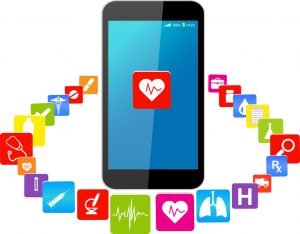Are apps for mental health good or evil? Making an informed decision.
By Nicole Mori, RN, MSN, APRN-BC, Research Advanced Practice Nurse
Medical mobile phone apps are changing the doctor-patient relationship by promising patients greater control over their care, lower costs, improved safety and convenience. Patient demand for apps is increasing with an estimated 50% of smartphone users having a medical app by the end of 2017. Acceptance among clinicians is increasing, with as many as 1/3 of doctors recommending health and wellness apps to their patients. In mental health, mobile apps have great potential as platforms for psychoeducation, self-management and enhanced patient-provider communication, in addition to increasing access and improving care for patients in rural and underserved areas.
Even though mental health apps could be useful, the market is still dominated by low-quality products that may not follow best clinical practice guidelines. There is little published research and reliable information to guide patients and clinicians while app store and user-generated ratings do not correlate with quality of content. This is a rapidly-evolving market, with new products and updates arriving on a weekly basis, therefore, clinicians need a framework to evaluate products, weigh risks versus benefits and offer guidance.
A review of recent literature, including 2016 published review of commercially-available mental health apps reveals significant concerns1:
Quality, functionality and reliability: Mobile health apps are often developed without the input of clinicians and without validation by research or reference to best practice guidelines. Information is often generic, incomplete and in some cases, inaccurate. Few apps cited their sources of information. Less than 50% of mental health apps used validated symptom scales, and when these were used, developers failed to properly credit the sources.
Patient Safety: Symptom-monitoring apps may not issue safety alerts instructing patients with high illness severity scores (such as severe suicidal ideation) to seek prompt medical evaluation. Few apps are designed to respond to indicators of deteriorating condition.
Burden on clinicians: Apps may generate large amounts of data that may not be clinically-relevant or useful. There is no framework for reimbursing patients for the costs of downloads or physicians for the time spent reviewing the data.
Absent regulatory oversight: Laws and regulations have failed to address privacy and cybersecurity risks associated with health apps. The majority of apps marketed to patients are exempt from regulations, with only a small number subject to FDA oversight. Security and disclosure standards are left to the discretion of developers who often lack the expertise and resources to manage protected health information.
Privacy and confidentiality: Health app developers are generally exempt from HIPAA regulations. Products storing sensitive patient information pose significant privacy and security risks but many still lack mechanisms to safeguard patient information such as passwords and encryption. There are no laws against the sale of patient information to data aggregators, who may in turn sell it to third parties such as credit card and insurance companies. Few products have comprehensive privacy policies, disclosing how personal information would be stored, used and protected. Patients assume that information entered into mobile apps is private, when this is often not the case3.
In view of these quality concerns, more research and development of evidence-based mobile apps driven by clinicians is needed in addition to legal protections to safeguard the privacy and security of patient data. At the present time, clinicians should be aware of the uneven level of quality in the app market and be familiar with a few reliable websites patients can visit for health education and be able to offer some guidance to patients using apps that store personal health information.
Discussion should address potential security risks and unauthorized disclosure of personal data, whether the product is evidence-based and in agreement with best practice guidelines and consider risks and potential benefits.
Note: The American Psychiatric Association has developed an App Evaluation Model to help clinicians evaluate health apps. The guidelines provide a list of issues that must be considered in order to make an informed decision about an app 2.
